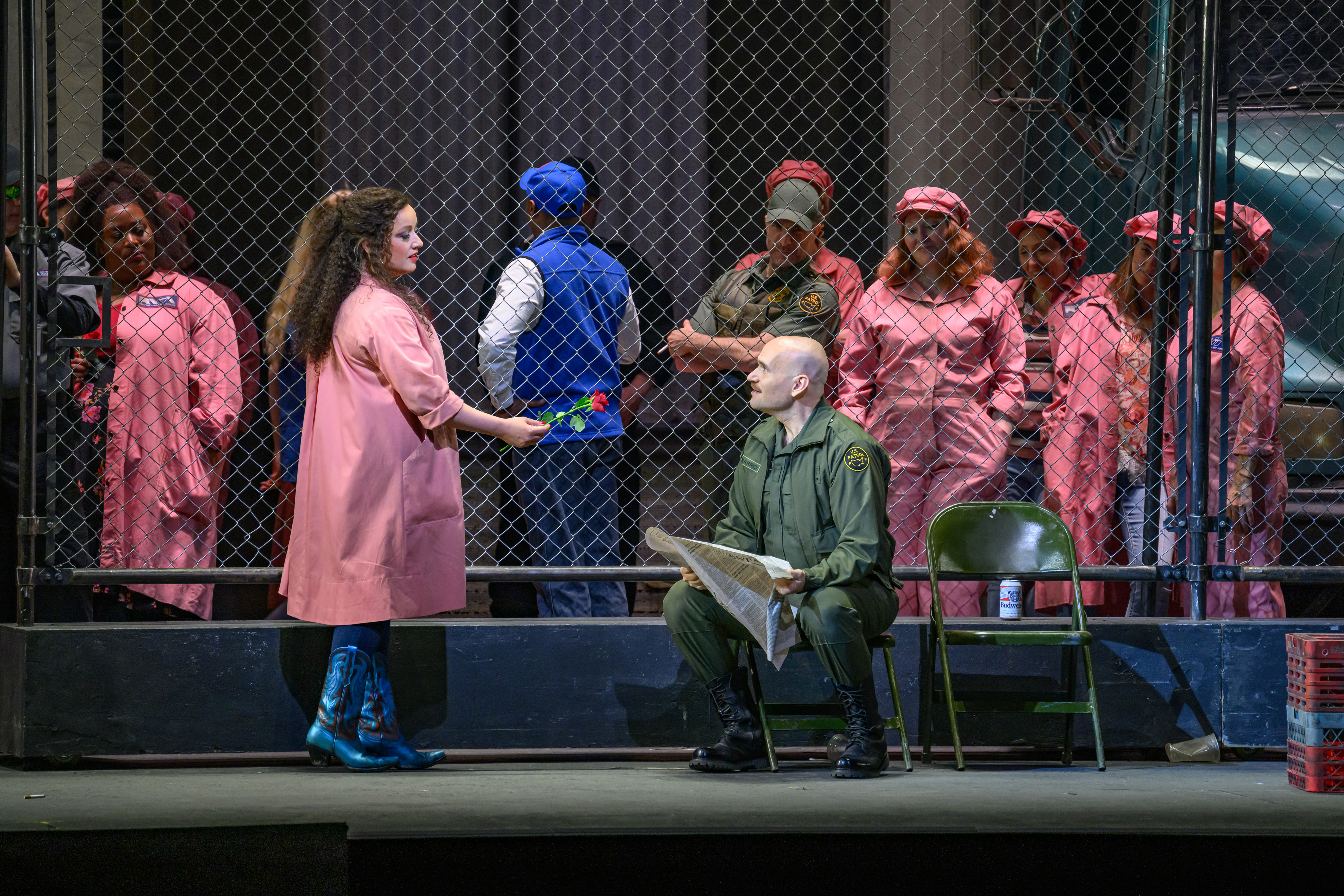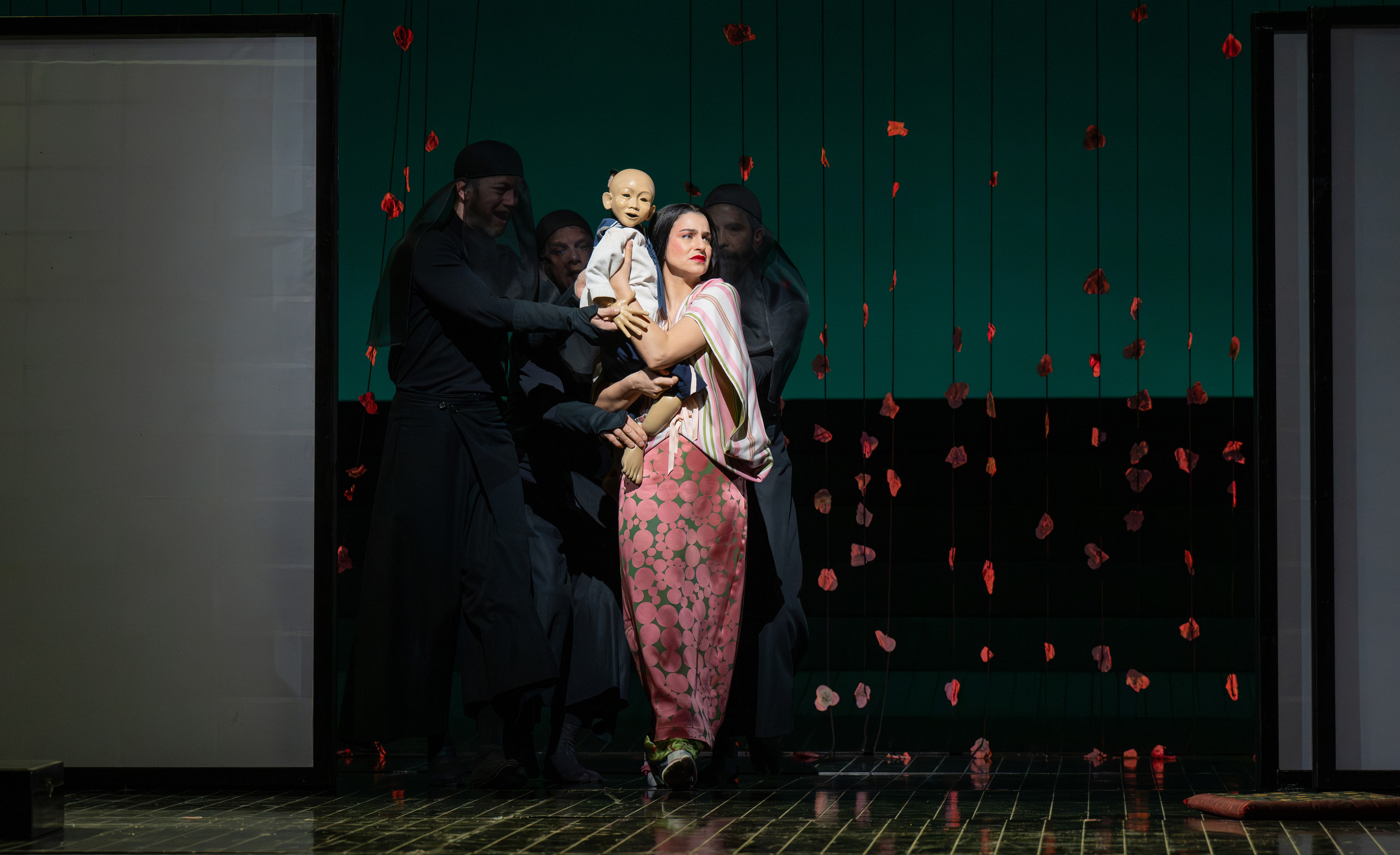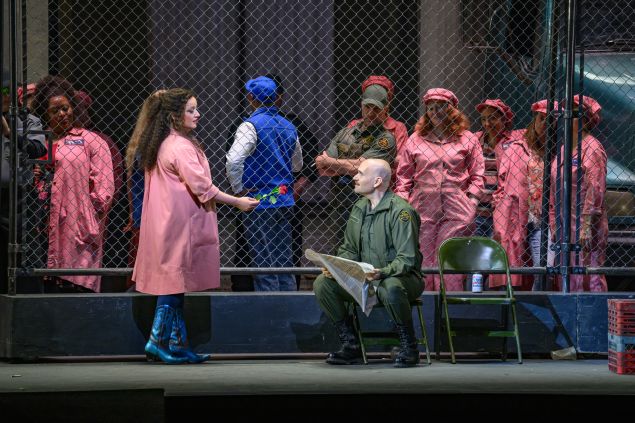
Those who swear they don’t know anything about opera are likely nonetheless familiar with Carmen and Madama Butterfly as they feature two of the world’s greatest archetypal heroines: the free-spirited gypsy and the innocent geisha. Currently, the Metropolitan Opera is offering unusually strong revivals of both popular works, and they’re made especially compelling by tenor Michael Fabiano’s lethal Don José and Asmik Grigorian’s shattering Cio-Cio-San; both singers are taking on their roles with the company for the first time.
Carrie Cracknell’s “American border town” Carmen looked as ill-conceived as it did when it premiered on New Year’s Eve. But four new principals and a debuting conductor made my return visit late last month quite rewarding. Bizet’s masterpiece felt freshly minted as it sizzled under Diego Matheuz’s fiery baton. The new Venezuelan conductor probably had limited time to rehearse his forces so things on the stage and in the pit weren’t always in sync. But he sensitively accompanied his singers and made memorable the irresistible preludes.
French mezzo Clémentine Margaine has long been an acclaimed Carmen and had already performed her role more than twenty times at the Met, but there was no trace of the routine as she donned this production’s signature turquoise cowboy boots for the first time. Her mature yet sultry Carmen in blue jeans couldn’t have been more different from her very young predecessor: Aigul Akhmetshina’s rebel slinked around in snug Daisy Dukes. Despite a pre-curtain announcement that she was suffering from allergies, Margaine effortlessly filled the huge house with her voluptuous sometimes raw mezzo, especially its flaming top, and her tart diction savored Meilhac and Halévy’s ripe libretto.
SEE ALSO: How Opera’s Crisis Can Become an Opera Renaissance
While Piotr Beczala, Ahkmetshina’s José, was thirty years her senior suggesting that Carmen might have had “daddy issues,” Margaine and Fabiano presented peers made for each other. Their first interactions were markedly different from the previous couple’s. During the Habanera, Beczala, his head buried in a newspaper, never glanced at a frustrated Ahkmetshina until she threw her rose at him. This time around, Margaine and Fabiano instantly locked eyes and her very individual views on love were directed only at him. By the time she tossed that crucial flower to him, he was already hopelessly ensnared.
With his shaved head and trim mustache, Fabiano looked the perfect Southern ne’er-do-well, and his usual white-hot intensity found its perfect vessel in José’s fatal obsession with the fearlessly independent Carmen. His one moment of naked vulnerability, José’s haunting flower song, gave Fabiano one chance to touch our hearts—but not Carmen’s—as he skillfully built the aria to a softly floated high B-flat climax.
Where Ahkmetshina clearly was just toying with Beczala, the palpable physical attraction between Margaine and Fabiano was always vividly conveyed. Even in the fierce, fatal final duet, their doomed connection scorched the stage until he bludgeoned her with one brutal blow.
Nine years after her Met debut in the same role, Ailyn Pérez returned as Micaëla. She and Fabiano brought a welcome intimacy to their duet although it was clear from his brotherly kiss on her forehead that he didn’t return her unusually forthright romantic interest. The soprano who has recently taken on heavier roles like Tosca, Butterfly and Elisabetta in Don Carlo sounded labored at moments in her show-stopping third-act aria but brought a convincing urgency to her pleas for José to return to his dying mother.
In the midst of also performing the leading role in Fire Shut Up in My Bones, Ryan Speedo Green lacked the elegant élan needed to put across the strutting Escamillo. Like many before him, he struggled with the challenging extremes of the role’s tessitura. His toreador did read as younger than Carmen and José, which brought an unusual frisson to their doomed triangle. Although the opera was sung in French—in an edition which the Met unfortunately still clings to that incorporates the dreary Guiraud recitatives—it wasn’t always clear what language Speedo Green was singing.
While Carmen continues at the Met until May 25, Butterfly concludes this season’s run with an HD transmission to movie theaters on May 11. Grigorian, the electrifying Lithuanian soprano, has been the most eagerly awaited new artist to debut at the Met this season. Reigning prima donna of the celebrated Salzburg Festival since 2017 (the year of her only prior U.S. appearance as Marie in a concert performance of Wozzeck with the New World Symphony), she brought to the company an unconventional Butterfly so musically inventive and dramatically provocative that her absence from the Met next season must be regretted. Eager to make amends for his late invitation to her, Peter Gelb has hastily announced that Grigorian will return to the Met in future seasons for the title roles of Jenufa and Salome.


It’s fortuitous that she finally came to the company in a role with which she feels a unique closeness: her mother, Irena Milkevičiūtė, performed Cio-Cio-San while pregnant with Grigorian, while Milkevičiūtė and Gegam Grigorian, the soprano’s father, also sang the Puccini opera together. The younger Grigorian brings none of the girlish mannerisms adopted by many sopranos to portray the fifteen-year-old geisha. She embodied an unusually self-possessed young girl, one seriously wounded by her family’s tragic past. She embraced her marriage to Pinkerton as her opportunity to transcend her situation. Her unshakable strength only faltered when she realized that the long-absent Pinkerton had indeed returned to her—but only to take away their child.
Having previously performed Butterfly in the Met’s elegantly classic Anthony Minghella production at the Vienna Staatsoper, Grigorian movingly embraced its stylization and its controversial use of a Bunraku-influenced puppet for her child. The production brings Cio-Cio-San on stage quite early and Grigorian’s entrance sounded a bit unsettled on opening night though she capped it with a shining high D-flat. Throughout the evening, she embodied Butterfly with a powerful stillness and strength of purpose that made Pinkerton’s crushing of her doomed hopes all the more painful.
The sequence leading to “Un bel dì” found her desperately attempting to convince Elizabeth DeShong’s fiercely devoted Suzuki—and herself—of the certainty of Pinkerton’s return. Grigorian’s explosive final “Aspetto” invited a long and loud ovation. Mingella faltered in having Butterfly’s anguished “Che tua madre” accompanied by mimed action behind her and in placing Butterfly far back on the bare stage for her suicide, but Grigorian’s stealthy concentration never faltered.
Her darkly cool soprano may lack the Italianate warmth some want in Puccini but the uncommonly rich middle of her voice made an intently powerful impact in much of Butterfly’s music. If her final “Tu tu piccolo iddio” taxed her upper register at her debut, she made more of an impact with it at her second performance when she was in notably better form.
Besides first-night nerves, Grigorian also had to cope with a new last-minute leading man when cover Chad Shelton replaced the AWOL Jonathan Tetelman who withdrew still suffering from the allergies that also plagued his final La Rondine at the Met. Shelton, who had stood out in recent Met performances of Peter Grimes and Dead Man Walking, coped well as Pinkerton though his bracing tenor doesn’t quite have the romantic appeal needed for one of the opera’s most passionate love duets. However, he excelled in the opera’s third act when he touchingly conveyed his character’s stark realization of the damage he’s caused.
Shelton’s effectiveness in that sequence came in stark contrast to Tetelman’s embarrassingly weepy traversal of the same scene several nights later when the much-buzzed-about tenor arrived as Pinkerton. Tall and handsome, he appeared as the picture-perfect embodiment of a man Cio-Cio-San might wait years for. But his self-regarding Pinkerton made the ugly American even more dislikable than usual. During the first act, for his big, admittedly exciting high notes, Tetelman would strike an unsubtle chest-out pose in order to blast them to the last row of the Family Circle, holding them slightly longer than he should have. But in the amiable back-and-forth with Sharpless, he was easily covered by Xian Zhang’s ebullient orchestra. When he turned his attentions to Grigorian’s eager bride, he became the smooth operator who easily seduces the young girl.
While post-performance bows aren’t usually considered part of the show, the Minghella production offers discreetly choreographed curtain calls culminating in a striking crimson-lit solo bow for the soprano. After his first Met Pinkerton, a grinning Tetelman ignored the plan and swiftly strode to the footlights well ahead of the rest of the cast, constructively making it all about him. He even outdid fellow shameless tenor showboat vittorio grigolo by eagerly gesturing to the audience to award him more applause. This boorish display came in stark contrast to his solo bow the night of his Met debut, when after his beautifully ardent Rondine Ruggero he tearfully acknowledged his well-earned bravos while handily snatching a big bouquet lobbed to him.
In addition to DeShong’s ideally supportive Suzuki, Lucas Meachem’s strongly sung, stern Sharpless contrasted well with Tony Stevenson’s meddling and obsequious Goro. Paul Corona’s Imperial Commissioner stood out while Robert Pomokov’s bluff Bonze failed to make its intended impact. Zhang, music director of the New Jersey Symphony who made her company debut in January, reveled in Puccini’s lush score, often choosing quite expansive tempi that Grigorian also seemed drawn to.
Both Carmen and Butterfly remain among the world’s most often performed operas for good reason. The Met’s impressive revivals remind audiences how rewarding revisiting familiar works can be.

